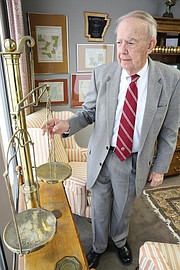There are many things in John Gill's lengthy career for which he may be well remembered. As senior attorney/shareholder and director with Gill Ragon Owen in Little Rock, he has successfully litigated, advised governors and helped shape the state's constitution. As an author and historian, he has chronicled many sights of Arkansas, thus enhancing the state's tourism industry.
His decades-long service to Methodist Family Health, a tenure that stretches more than 50 years, ranks right up there with the best of these impressive credentials.
"Well, my wife, Marjem was a social worker out there, we didn't have any children at that point," Gill says of his origins with the Little Rock organization. "Edwin Keith was the superintendent then; he had been associate pastor at First United Methodist Church of Little Rock at one point. Anyway, he had some legal issue come up, and either he knew I was a lawyer or he asked Marjem or Marjem said, 'We'll get John to answer that for you.' And that's how it happened."
Methodist Family Health was founded in 1899 as Arkansas Methodist Orphanage and operated as such for the first half of its existence. Gill recalls when he came onto the board in the mid-1960s the organization was in the midst of fundamentally changing the way it delivered services, moving from a large institutional model to smaller group homes staffed by house parents as Methodist Children's Homes.
"The house parent-child relationship is the basis upon which the organization prospered for decades," he says. "Each cottage, all of the nice brick homes, had a house parent, almost always a husband and wife and a certain number of kids, maybe 5 or 6, not a huge number."
"One of the reasons the house parent thing worked was you could discipline a child, educate him, help raise him or her on what I'm calling a one-on-one relationship. That was primarily the house parent's job; there were social workers that were there, but it was basically their responsibility."
Gill says the back story of children living in the homes was also evolving. In addition to orphans of the classic definition, homes served an increasing number of children suffering from other dysfunctional backgrounds. The organization implemented the Teaching Family Model of care in 1992, a treatment methodology effective in serving hard-to-place children, and turned its eye toward expanding the number of units statewide to reach more children.
It was a complex endeavor, Gill says, made more so by the ministry's changing payment model, going from directly funded by the Methodist Church to being compensated through state and federal programs.
"When the state gets involved, then it gets more rules, more do's, more don't's, which is understandable," Gill says. "I mean, the state's putting their money in it, so they've got to have more controls."
Gill's counsel and leadership enabled the board to adapt not only to these changing requirements and audiences but constantly consider how Methodist Family Health (the group reorganized under that banner in 2003) could better meet community needs. The most ambitious example of this is the establishment of the Methodist Behavioral Hospital in Maumelle in 2001. Gill played a key role in the acquisition and launch of the hospital, the only service provider of its kind in the state.
"The child that you get today is a different child [from] 50 years ago," he says. "With the acquisition of the Methodist Behavioral Hospital, we implemented the Teaching-Family Model there that we'd previously implemented through Methodist Family Home. That changed the method by which you were teaching the child. Not a house mother necessarily, but a group of teachers almost in a school environment teaching the child."
"With that, we now offer the continuum of care. It enables us to take the troubled child, the child from a broken home or the mentally disturbed child and keep them within the bounds of Methodist Family Health services. It may be at the children's home or the behavioral hospital or we have outpatient services. We moved from having just a mother and a father in a group home to this model of care that includes dozens and dozens of people in various locations."
As complex and mercurial as Methodist Family Services' mission is -- just last year the federal government radically changed its funding model, causing the group to realign certain services -- Gill sees good things for the organization upon which he has left such an indelible mark.
"Methodist has a golden future as far as I'm concerned," he says. "You're around an organization as long as I've been around this one and you see the changes and know the people that are there making it work. I think nothing's standing in its way except money; [the government is] always changing the formula and changing the rules and that's life, but it makes it awfully hard to know exactly what the future is.
"In spite of this, what they're doing is being done well. The success stories are just enormous and to get to be a part of something like that is pretty special."
High Profile on 04/12/2020
![John Gill, a lawyer, author and longtime advocate for Methodist Family Services in Little Rock, has been involved with the organization for more than 50 years. “Methodist [Family Services] has a golden future as far as I’m concerned,” he says.
(Special to the Democrat-Gazette/Dwain Hebda)](https://wehco.media.clients.ellingtoncms.com/img/photos/2020/04/12/resized_303085-gill-cover-0412_13-29197_t800.JPG?90232451fbcadccc64a17de7521d859a8f88077d)
